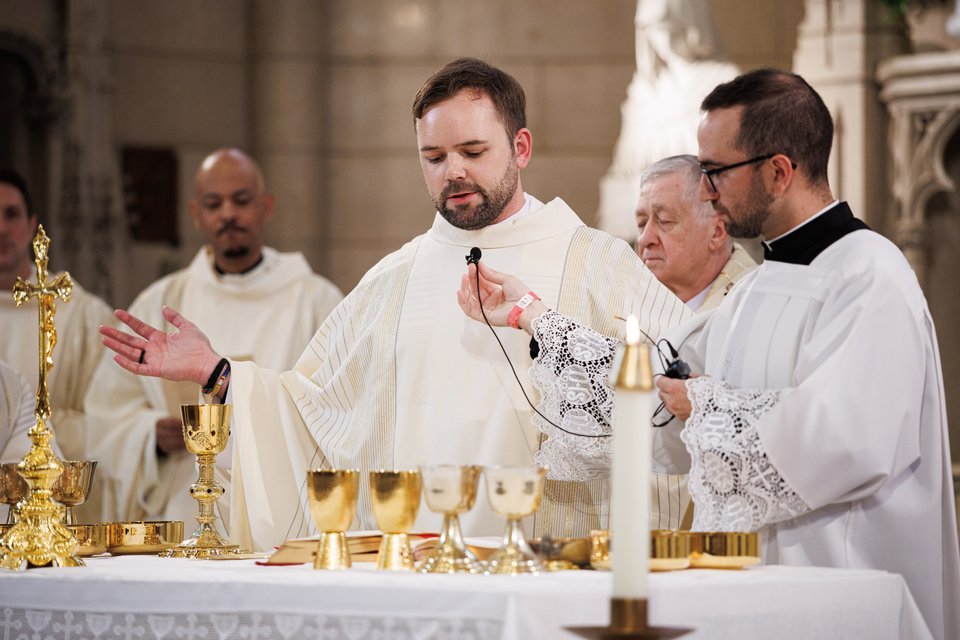Auxiliaries sharpen focus on Hispanics, vocations
Detroit — The Archdiocese of Detroit’s three new auxiliary bishops will not only take on regional administrative duties, but also want to help energize people in their spiritual lives.
They will also use their experience to address two of the major challenges facing the archdiocese.
Both Auxiliary Bishops Donald Hanchon and Jose Arturo Cepeda have strong backgrounds in ministry to Hispanic Catholics — the fastest growing segment of the Catholic Church in the United States.
At the same time, both Bishops Cepeda and Michael Byrnes have years of experience in fostering vocations and the formation of seminarians — Bishop Cepeda as rector of the archdiocesan seminary in San Antonio, Texas, and Bishop Byrnes as vice rector of Sacred Heart Major Seminary in Detroit.
The three spoke of how they hope to be of support to Archbishop Allen Vigneron’s leadership at a news conference the morning of their May 1 episcopal ordinations.
Bishop Hanchon combined both of those themes when he said he hopes to encourage vocations to the priesthood, diaconate and religious life from among Hispanic Catholics, as well as promoting greater lay ministry involvement.
Hispanic Catholics already make up about one-fifth of the faithful in the archdiocese, and their rate of growth is “off the charts,” said Bishop Hanchon. Although he is of Irish and Polish heritage, he has been called “almost a Hispanic bishop” because of his history of involvement with area Hispanics.
Bishop Cepeda spoke of his expectation to be involved in promoting vocations, joking that “once a vocations director, always a vocations director.” He said he looks forward to meeting the people of the archdiocese when he returns to stay in June, after the end of the current term at the seminary in San Antonio.
While Bishop Byrnes new administrative duties will be in Macomb and St. Clair counties, he said he will also remain involved with the seminary, and further hopes to be involved in outreach to unchurched persons in the city.
A major goal of his episcopal ministry, Bishop Byrnes continued, will be to “strengthen preaching.”
“The number one thing Catholic people want is better, clearer preaching,” he said, adding that he believes, “strengthening their understanding of the Scriptures would be helpful for a great many priests.”
Bishop Hanchon said that desire for better preaching “isn’t just that people want to be entertained,” but part of a broader hunger for greater Christian involvement.
“They want to feel a responsibility, they want to feel claimed by Christ and given a work to do — Christ has a plan, and you are part of it,” he said.
“I’ve seen the light go on in people’s eyes from participation in evangelization programs like Alpha,” Bishop Hanchon said, referring to the Alpha Course offered by some parishes in the archdiocese.
Also addressing the need for evangelization among those already at least nominally Catholic — what Blessed John Paul called “the New Evangelization” — Bishop Cepeda said such efforts should involve entire families. “All are called to be missionaries — grandparents, adults, young adults and the children.”
He said he hoped to see programs that “bring families together so to know that they are united in Christ.”
All three of the new auxiliaries were ordained to the episcopate that afternoon before a capacity congregation at the Cathedral of the Most Blessed Sacrament in Detroit’s North End.
As bishops, the three will be able to become even more effective in their service to the Church, Archbishop Allen Vigneron said, explaining that they were being ordained so “that they may better participate in what the Lord wants them to do.”
Speaking of the new bishops’ connection to the Apostles and, through them, to Christ, through Apostolic Succession, he said, “I hand on what has been handed on to me in trust.”
In an ordination ceremony resonating with timeless tradition, the three bishops-elect were presented, the Apostolic Mandate — the authorization from the Holy Father for their consecration — was read, and the bishops-elect questioned about their fidelity to the Gospel and to the Church.
The bishops-elect lay prostrate before the altar during the Litany of supplication, after which Archbishop Vigneron — as principal consecrator — conferred the sacrament by laying his hands on the head of each of the three men.
His action was followed by Archbishop John Nienstedt of St. Paul-Minneapolis and Bishop John Quinn of Winona — both former Detroit auxiliary bishops — who came in from Minnesota to serve as the official co-consecrators.
Then, all of the nearly 30 other Catholic bishops present followed suit, laying their hands on the head of each new bishop.
Each new bishop knelt before the archbishop so that his head could be anointed with holy chrism, and each was invested with a ring, miter and crozier (his pastoral staff).
The process completed, the new bishops received an enthusiastic ovation from the many friends, family and well-wishers who filled the nave of the cathedral, the many priests and deacons in the transepts and the bishops in the chancel.
Aged 41, Bishop Cepeda became the youngest Catholic bishop in the United States. Bishop Hancon is 63, Bishop Byrnes 52.
It was an event that reflected both the ancient traditions of the Church and the contemporary diversity of the archdiocese and the three new bishops. Archbishop Vigneron and Bishop Hanchon — who expressed the appreciation of all three new bishops to everyone who had helped bring them to this day — spoke in both English and Spanish.
Hymns and sung parts of the liturgy included portions in English, Spanish, Latin and Greek. There were hymns from centuries past, as well as contemporary ones, and a new musical setting of Psalm 95 composed especially for the ceremony by Louis Canter, the music director.
Besides Archbishop Nienstedt and Bishop Quinn, archbishops and bishops from many other dioceses joined in the ceremony, including Archbishop Jose Gomez of Los Angeles, who was Bishop Cepeda’s superior in his former position as archbishop of San Antonio.
The more than 30 bishops taking part in the ceremony included current Detroit Auxiliary Bishop Francis Reiss and retired Auxiliary Bishop Moses Anderson, SSE.
Former Detroit auxiliaries there included Bishops Leonard Blair of Toledo, Earl Boyea of Lansing, Daniel Flores of Brownsville (Texas), Bernard Harrington (retired) of Winona (Minn.), Walter Hurley of Grand Rapids, Joseph Imesh (retired) of Joliet (Ill.) and Dale Melczek of Gary (Ind.).
Cardinal Adam Maida, Archbishop Vigneron’s predecessor as archbishop, and retired Bishop Patrick Cooney of Gaylord, a former Detroit auxiliary, were seated in the choir, as was Greek Orthodox Metropolitan Nicholas.
Bishop Hanchon will become regional moderator for the Central Region and will be based in southwest Detroit even after he leaves as pastor of Holy Redeemer Parish.
Bishop Byrnes will continue an affiliation with Sacred Heart Major Seminary, but will be moving to a residence somewhere in Macomb County as he takes up his new duties as regional moderator of the Northeast Region.
Bishop Cepeda will be based somewhere in the Northwest Region, where he will serve as regional moderator in addition to his special focus on the Hispanic community throughout the archdiocese.













